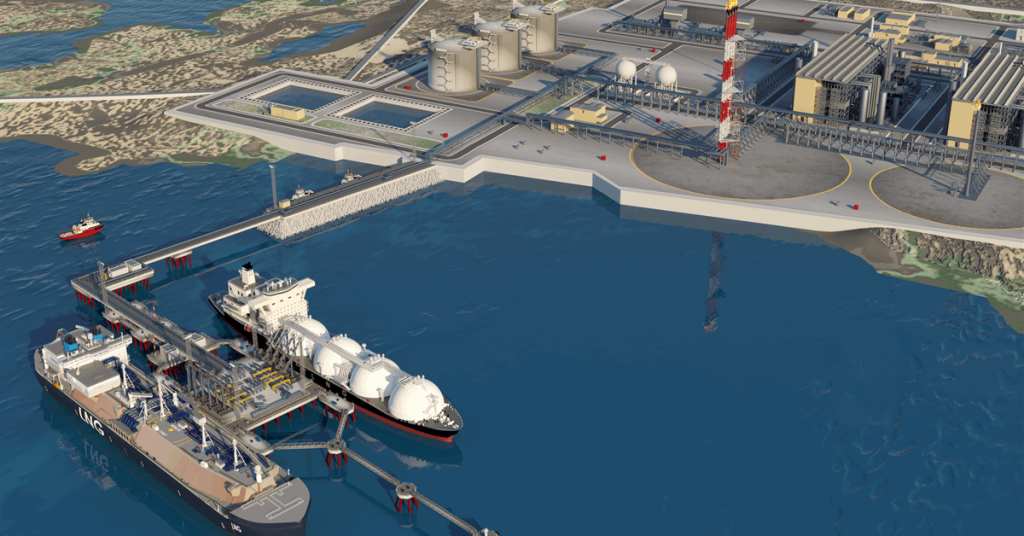Delfin Midstream Inc. is moving closer to a positive final investment decision (FID) for its deepwater port project in Louisiana with the signing of two agreements.
Delfin entered into an agreement with Siemens Energy Inc. to reserve manufacturing capacity for four SGT-750 gas turbine mechanical drive packages, the company said in a news release. The equipment will be used to drive the mixed-refrigerant compressors for Delfin’s liquefied natural gas (LNG) liquefaction system.
Delfin said it also agreed to an Early Works program with Samsung Heavy Industries and Black & Veatch Inc. to further detail floating liquefied natural gas (FLNG) vessel design specifications as the basis for the lump-sum, turn-key engineering, procurement, construction, and integration (EPCI) contract and to prepare both contractors for the execution of the project.
Financial terms of the contracts were not disclosed.
The work will de-risk project execution and ensure both contractors are prepared for immediate project execution following a positive FID, expected in the fall of 2025, Delfin said.
Delfin CEO Dudley Poston said, “This is an incredibly exciting time for the development of Delfin’s critical energy infrastructure project. Following the successful issuance of the deepwater port license by MARAD, all workstreams are on schedule and the project is currently on track for FID in the fall of 2025. By making this large investment to lock-in critical manufacturing capacity, we have secured our execution schedule with the anticipated delivery of our first FLNG vessel from Samsung Heavy Industries shipyard in 2029”.
Siemens Energy executive board member Karim Amin said, “Siemens Energy is excited to support Delfin’s energy infrastructure project by providing the critical Gas Turbine Mechanical Drive packages the Company needs as it moves towards delivering the first offshore LNG project in the United States. The modular design, high power-to-weight ratio and ability to operate under diverse conditions make Siemens Energy gas turbines an innovative and ideal technology solution for this leading low-emissions energy infrastructure project”.
In March, Delfin Midstream subsidiary Delfin LNG LLC received a license from the Maritime Administration (MARAD) to own, construct, operate, and eventually decommission a deepwater port that aims to export LNG from the USA.
The brownfield deepwater port that Delfin is developing “requires minimal additional infrastructure investment” to support up to three floating LNG vessels producing up to 13.2 million metric tons of LNG annually, the company said.
Delfin stated that the license was issued pursuant to the Deepwater Port Act of 1974 and MARAD’s 2017 Record of Decision and is in accordance with President Trump’s Executive Order titled, “Unleashing American Energy,” signed January 20, 2025.
The Department of Energy (DOE) approved an LNG export permit extension for Delfin LNG, granting additional time to begin exports from the project. The permit extension had been delayed under the previous administration, according to the company.
Delfin LNG received a positive Record of Decision from MARAD and approval from DOE for long-term exports of LNG to countries that do not have a Free Trade Agreement with the USA.
Delfin LNG owns the UTOS pipeline which runs from Station 44 to the WC-167 platform. Delfin has a long-term lease agreement for the HIOS pipeline running from WC 167 south to the Delfin Deepwater Port location. The UTOS pipeline is the only 42-inch pipeline in the Gulf and was formerly owned and operated by Enbridge, according to the company.
To contact the author, email rocky.teodoro@rigzone.com
What do you think? We’d love to hear from you, join the conversation on the
Rigzone Energy Network.
The Rigzone Energy Network is a new social experience created for you and all energy professionals to Speak Up about our industry, share knowledge, connect with peers and industry insiders and engage in a professional community that will empower your career in energy.
element
var scriptTag = document.createElement(‘script’);
scriptTag.src = url;
scriptTag.async = true;
scriptTag.onload = implementationCode;
scriptTag.onreadystatechange = implementationCode;
location.appendChild(scriptTag);
};
var div = document.getElementById(‘rigzonelogo’);
div.innerHTML += ” +
‘‘ +
”;
var initJobSearch = function () {
//console.log(“call back”);
}
var addMetaPixel = function () {
if (-1 > -1 || -1 > -1) {
/*Meta Pixel Code*/
!function(f,b,e,v,n,t,s)
{if(f.fbq)return;n=f.fbq=function(){n.callMethod?
n.callMethod.apply(n,arguments):n.queue.push(arguments)};
if(!f._fbq)f._fbq=n;n.push=n;n.loaded=!0;n.version=’2.0′;
n.queue=[];t=b.createElement(e);t.async=!0;
t.src=v;s=b.getElementsByTagName(e)[0];
s.parentNode.insertBefore(t,s)}(window, document,’script’,
‘https://connect.facebook.net/en_US/fbevents.js’);
fbq(‘init’, ‘1517407191885185’);
fbq(‘track’, ‘PageView’);
/*End Meta Pixel Code*/
} else if (0 > -1 && 98 > -1)
{
/*Meta Pixel Code*/
!function(f,b,e,v,n,t,s)
{if(f.fbq)return;n=f.fbq=function(){n.callMethod?
n.callMethod.apply(n,arguments):n.queue.push(arguments)};
if(!f._fbq)f._fbq=n;n.push=n;n.loaded=!0;n.version=’2.0′;
n.queue=[];t=b.createElement(e);t.async=!0;
t.src=v;s=b.getElementsByTagName(e)[0];
s.parentNode.insertBefore(t,s)}(window, document,’script’,
‘https://connect.facebook.net/en_US/fbevents.js’);
fbq(‘init’, ‘1517407191885185’);
fbq(‘track’, ‘PageView’);
/*End Meta Pixel Code*/
}
}
// function gtmFunctionForLayout()
// {
//loadJS(“https://www.googletagmanager.com/gtag/js?id=G-K6ZDLWV6VX”, initJobSearch, document.body);
//}
// window.onload = (e => {
// setTimeout(
// function () {
// document.addEventListener(“DOMContentLoaded”, function () {
// // Select all anchor elements with class ‘ui-tabs-anchor’
// const anchors = document.querySelectorAll(‘a .ui-tabs-anchor’);
// // Loop through each anchor and remove the role attribute if it is set to “presentation”
// anchors.forEach(anchor => {
// if (anchor.getAttribute(‘role’) === ‘presentation’) {
// anchor.removeAttribute(‘role’);
// }
// });
// });
// }
// , 200);
//});

